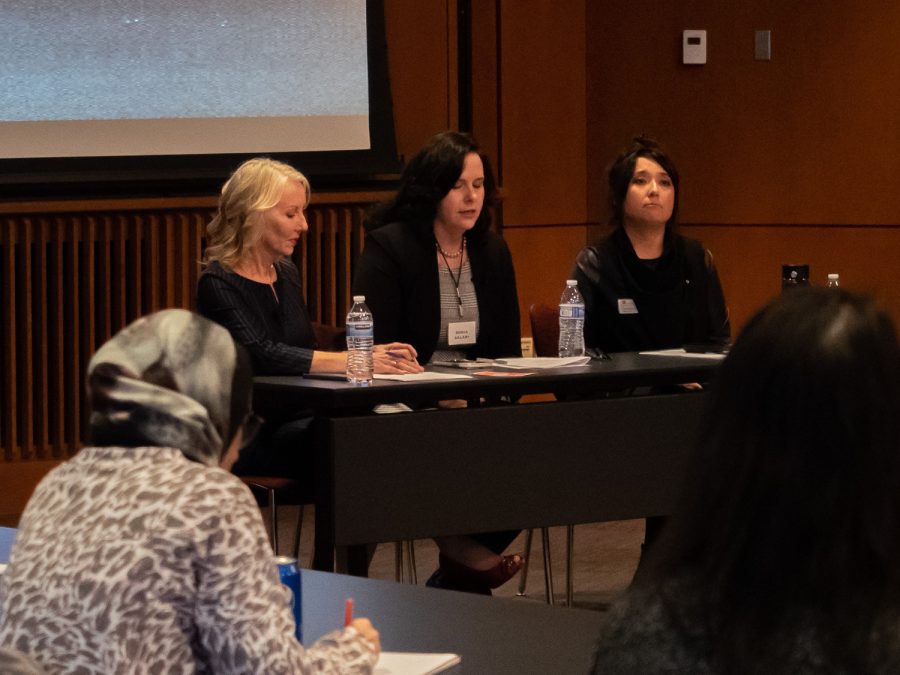U Makes Public Policy Personal in Gender-Based Violence Discussion Panel
Sonia Salari, professor in the Department of Family and Consumer Studies, and Annie Isabel Fukushima, associate dean of Undergraduate Studies and professor of Ethnic Studies lead the panel discussion, “Making Public Policy Personal: A Focus on Gender-based Violence,” moderated by PBS Utah’s Mary Dickson, on Wednesday, March 1, 2023 at the University of Utah’s J. Willard Marriott Library in Salt Lake City. (Photo by Jack Gambassi | The Daily Utah Chronicle)
March 3, 2023
On Wednesday afternoon, the J. Willard Marriott Library at the University of Utah hosted a panel discussion, “Making Public Policy Personal: A Focus on Gender-based Violence.”
The Gould Auditorium was filled with attendees. PBS Utah’s Mary Dickson led a panel discussion with Annie Isabel Fukushima, associate dean of undergraduate studies and professor of ethnic studies, and Sonia Salari, professor of family and consumer studies.
Fukushima said that nearly half of the responders to gender-based domestic violence say they are under-resourced, which leaves victims uncared for.
“Even though there is a clear danger and physical abuse, only 1 in 20 victims received medical care,” she said. “Overall, there is a need to respond to domestic violence and resource social services that are so vital to support people.”
According to a Harvard Gazette study, the National Domestic Violence Hotline received more than 74,000 calls, chats and texts in February 2022 — the highest volume in the 25-year history — largely because of the lockdowns at the time to control the spread of the COVID-19 virus. Although there was a spike in overall reporting, professionals saw the number of youth reporting drop during the pandemic.
Fukushima said grandparents are some of the most common reporters of youth-based domestic violence. She added grandparents being separated from their grandkids during the pandemic has contributed to the dip in reporting of youth being domestically abused.
Since online learning and Zoom have become used more often since the pandemic, Fukushima explained people have found it harder to tell when someone is a victim of domestic violence because they can “sort of hide behind the screen.”
To combat the dip in youth reporting, Salari said she hopes to see a texting platform launched to make it more comfortable for youth to report domestic violence.
At the event, organizers had a QR code that attendees could scan to keep up to date on the bills related to gender-related domestic violence.
Fukushima said locals should shift their focus to ways they can help in local communities by not forgetting that individual organizations have specific policies, encouraging them to be aware and involved in the U’s policies on domestic violence.
“We can enact change in the places we work and the places we live in,” Fukushima said.
Fukushima also pointed to the local work some of her students have done that people can get involved with.
“Something I don’t want to minimize is the power of what’s happening in undergraduate research and the work that our students are doing,” Fukushima said.
One of her students just completed a Dear Sister Letter Campaign that encouraged people to write a letter of support to a female-identifying person in their life who impacted their resiliency after sexual violence.
Many undergraduate students attended the event including Illise Ellsworth, a sophomore social work major.
“I came here because I take classes in social work and social justice and I want to see a change in the state of Utah,” Ellsworth said.
Near the end of the event, Salari and Fukushima shared their closing remarks as they look forward to 2023.
Salari explained 2022 was a productive year for victims of gender-based domestic violence, but it’s essential to remember the movement can’t stop now.
“I would prefer that we don’t think of it as the year of the domestic violence because that means we only get one year,” she said.









